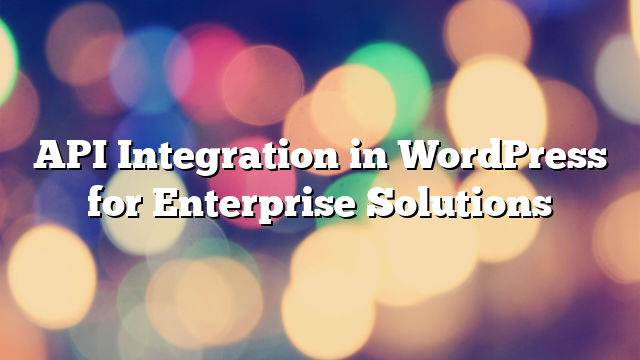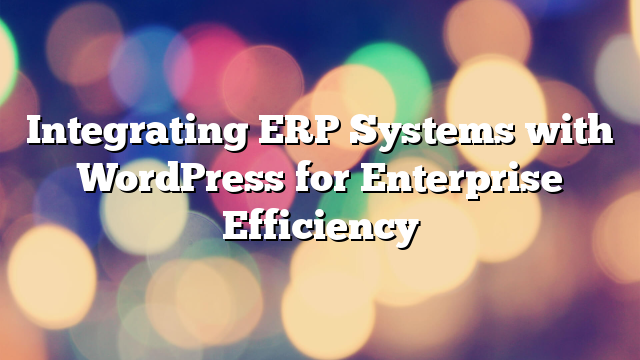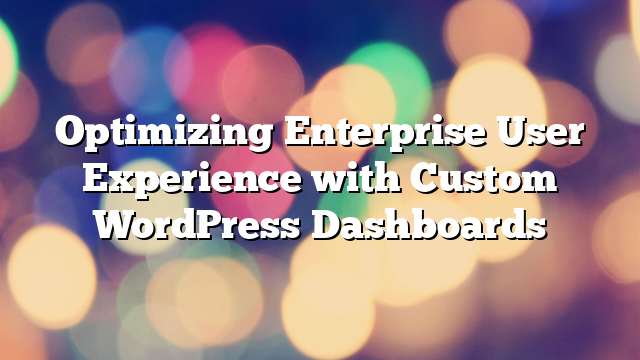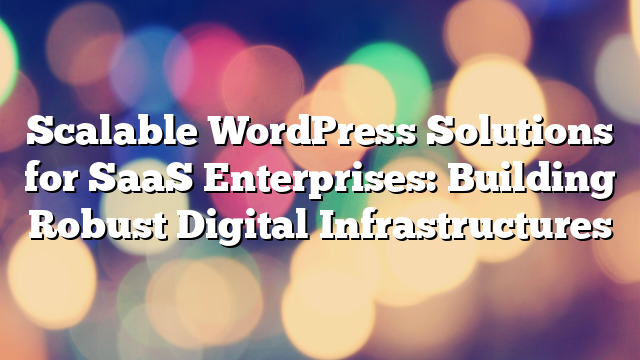API Integration in WordPress for Enterprise Solutions
14.10.2024

In today’s interconnected digital landscape, enterprises rely heavily on various platforms and systems to streamline operations, manage customer relationships, and deliver dynamic content. To ensure these systems work together seamlessly, API integration plays a pivotal role. For enterprises using WordPress as their content management system (CMS), integrating APIs can significantly enhance functionality, enabling businesses to create feature-rich and scalable solutions. In this article, we will explore how API integration in WordPress benefits enterprise solutions and why it’s crucial for large-scale businesses.
What is API Integration?
An Application Programming Interface (API) allows different software systems to communicate and exchange data with each other. By integrating APIs, enterprises can connect WordPress to other platforms, applications, and services, enabling the seamless flow of data between systems. This opens up numerous possibilities, such as automating workflows, integrating third-party services, or providing real-time data synchronization between WordPress and external systems.
The Importance of API Integration for Enterprises
For enterprise-level businesses, managing data and systems efficiently is crucial to maintaining competitive advantage. WordPress, while being a powerful CMS, often needs to be integrated with other platforms to meet the complex requirements of large organizations. API integration allows businesses to enhance their WordPress sites by connecting them to external applications such as customer relationship management (CRM) systems, eCommerce platforms, and marketing tools.
Here are some key reasons why API integration is essential for enterprise WordPress solutions:
1. Centralized Data Management
Enterprises typically deal with large amounts of data stored across multiple platforms, such as CRMs, ERPs, and other internal systems. Integrating these systems with WordPress through APIs enables businesses to centralize data management. This ensures that critical information such as customer data, inventory levels, and sales data is synchronized across all platforms, reducing the risk of data silos and inconsistencies.
For example, by integrating WordPress with a CRM like Salesforce via APIs, businesses can ensure that customer data is updated in real-time across both systems. This allows teams to access the most current information and make data-driven decisions more effectively.
2. Enhanced User Experiences
API integration allows enterprises to offer enhanced and personalized user experiences on their WordPress sites. By connecting WordPress to external services, businesses can provide real-time information and features that engage users more effectively.
For instance, integrating a weather API can display localized weather information to users, or integrating a shipping API can provide real-time tracking updates for eCommerce customers. The possibilities for enhancing user experiences through API integration are endless, from personalized recommendations to dynamic content delivery based on user behavior.
3. Automation and Efficiency
Automation is a key benefit of API integration for enterprises. By automating routine tasks and workflows, businesses can improve efficiency and reduce manual work. For example, integrating WordPress with marketing automation platforms like HubSpot or Mailchimp allows enterprises to automate tasks such as email campaigns, lead generation, and customer segmentation directly from their WordPress site.
Automated workflows save time and ensure that business processes are consistent and scalable. API integrations also allow enterprises to automatically update product catalogs, synchronize inventory, and manage customer inquiries more efficiently.
4. Improved Scalability
As enterprises grow, their digital solutions must scale to meet increasing demands. API integration enables businesses to extend the functionality of their WordPress sites without overhauling the entire system. By leveraging APIs, enterprises can integrate new tools and services as needed, ensuring that their WordPress site grows alongside their business.
For example, integrating WordPress with cloud services like Amazon Web Services (AWS) or Microsoft Azure through APIs can provide scalable storage, enhanced security, and performance optimization as traffic increases. This flexibility allows enterprises to adapt quickly to changes in their operational needs.
5. Real-Time Data Syncing
In today’s fast-paced business environment, real-time data synchronization is crucial for making timely and informed decisions. API integration ensures that data flows seamlessly between WordPress and other systems, providing up-to-date information to all stakeholders.
For example, integrating an API that connects WordPress to a real-time stock management system can ensure that product availability is accurately reflected on an eCommerce site. This helps avoid issues such as overselling, improves customer satisfaction, and reduces the need for manual data entry.
Common API Integrations for Enterprise WordPress Sites
API integrations can enhance WordPress functionality in various ways. Below are some common API integrations used in enterprise WordPress solutions:
1. CRM Integration
Customer relationship management (CRM) systems are essential for enterprises to manage customer data, sales, and interactions. Integrating a CRM like Salesforce, Zoho, or HubSpot with WordPress enables businesses to capture leads, track customer behavior, and sync data seamlessly between the CRM and the WordPress site.
This integration allows enterprises to personalize user experiences, automate lead generation workflows, and gain valuable insights into customer behavior, helping drive growth and improve customer relationships.
2. eCommerce and Payment Gateway Integration
For enterprises running eCommerce operations, integrating WordPress with eCommerce platforms and payment gateways is critical. APIs allow WordPress to communicate with platforms like WooCommerce, Shopify, and Magento, enabling enterprises to manage product catalogs, orders, and customer data efficiently.
Payment gateway integrations, such as Stripe, PayPal, and Authorize.net, enable secure and seamless transactions on enterprise WordPress sites. These APIs ensure that payments are processed securely while reducing friction for users during the checkout process.
3. Social Media and Marketing Tool Integration
Enterprises rely heavily on social media and marketing tools to engage with customers and promote their products or services. API integration with platforms like Facebook, Twitter, Google Analytics, and Mailchimp allows enterprises to sync marketing data, automate social media posts, and track performance directly from their WordPress site.
These integrations help enterprises create cohesive marketing strategies, improve customer engagement, and analyze the effectiveness of their campaigns through a unified dashboard.
4. Cloud Service Integration
Many enterprises use cloud services for storage, security, and scalability. API integration with cloud providers such as AWS, Google Cloud, and Azure allows WordPress sites to take advantage of cloud-based infrastructure, improving performance and ensuring that the site can handle high traffic volumes.
Enterprises can also use cloud APIs to store large media files, enable CDN (content delivery networks), or set up backup and disaster recovery solutions for their WordPress site, ensuring business continuity.
5. ERP System Integration
Enterprise resource planning (ERP) systems are used by enterprises to manage key business functions such as finance, HR, and supply chain management. Integrating ERP systems like SAP, Oracle, or Microsoft Dynamics with WordPress ensures that business-critical data is synchronized across platforms, reducing manual entry and improving overall efficiency.
Challenges of API Integration in WordPress
While API integration offers significant benefits for enterprises, it can also present some challenges:
- Complexity: API integration can be complex, especially when connecting multiple systems with different data structures. Enterprises must ensure that their development teams have the necessary expertise to handle API integration.
- Security: Exposing WordPress to external systems through APIs can introduce security risks. Enterprises must implement robust security measures, such as encryption, authentication, and monitoring, to protect their data.
- Performance: Poorly implemented API integrations can negatively impact site performance, especially when dealing with real-time data syncing or large volumes of data. Enterprises must ensure that API requests are optimized and that server resources are sufficient to handle the load.
Conclusion
API integration is a powerful tool for enterprises looking to extend the capabilities of their WordPress sites. By connecting WordPress to other platforms and services, businesses can streamline operations, improve user experiences, and automate workflows, making their digital presence more dynamic and scalable.
If your enterprise is ready to harness the power of API integration in WordPress, contact AllWebDev to learn how we can help you build an integrated and efficient WordPress solution tailored to your needs.



